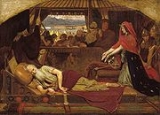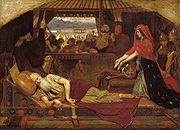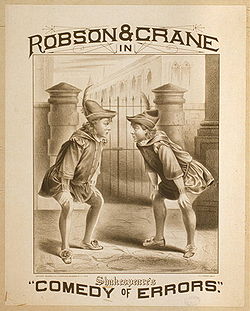
Anagnorisis
Encyclopedia
Anagnorisis is a moment in a play or other work when a character makes a critical discovery. Anagnorisis originally meant recognition in its Greek context, not only of a person but also of what that person stood for. It was the hero
's sudden awareness of a real situation, the realisation of things as they stood, and finally, the hero's insight into a relationship with an often antagonist
ic character
in Aristotelian
tragedy
.
 In the Aristotelian definition of tragedy, it was the discovery of one's own identity or true character (e.g. Cordelia, Edgar, Edmund, etc. in Shakespeare's King Lear
In the Aristotelian definition of tragedy, it was the discovery of one's own identity or true character (e.g. Cordelia, Edgar, Edmund, etc. in Shakespeare's King Lear
) or of someone else's identity or true nature (e.g. Lear's children, Gloucester's children) by the tragic hero. In his Poetics, Aristotle defined anagnorisis as "a change from ignorance to knowledge, producing love or hate between the persons destined by the poet for good or bad fortune" (Part II: Section A.3:d. Recognition).
Shakespeare did not base his works on Aristotelian theory of tragedy, including use of hamartia
, yet his tragic characters still commonly undergo anagnorisis as a result of their struggles..
Aristotle was the first writer to discuss the uses of anagnorisis, with peripeteia
caused by it. He considered it the mark of a superior tragedy, as when Oedipus
killed his father and married his mother in ignorance, and later learned the truth, or when Iphigeneia in Tauris
realizes in time that the strangers she is to sacrifice are her brother and his friend, and refrains from sacrificing them. Aristotle considered these complex plots superior to simple plots without anagnorisis or peripetia, such as when Medea
resolves to kill her children, knowing they are her children, and does so.
Another prominent example of anagnorisis in tragedy is in Aeschylus
's "The Choephoroi" ("Libation Bearers") when Electra
recognizes her brother, Orestes
, after he has returned to Argos
from his exile, at the grave of their father, Agamemnon
, who had been murdered at the hands of Clytemnestra
, their mother. Electra
convinces herself that Orestes
is her brother with three pieces of evidence: a lock of Orestes
's hair on the grave, his footprints next to the grave, and a piece of weaving which she embroidered herself. The footprints and the hair are identical to her own. Electra
's awareness of her brother's presence, who is the one person who can help her by avenging the death of their father.
 The section of Aristotle's Poetics dealing with comedy did not survive, but many critics also discuss recognition in comedies. A standard plot of the New Comedy was the final revelation, by birth tokens, that the heroine was of respectable birth and so suitable for the hero to marry. This was often brought about by the machinations of the tricky slave
The section of Aristotle's Poetics dealing with comedy did not survive, but many critics also discuss recognition in comedies. A standard plot of the New Comedy was the final revelation, by birth tokens, that the heroine was of respectable birth and so suitable for the hero to marry. This was often brought about by the machinations of the tricky slave
. This plot appears in Shakespeare's The Winter's Tale
, where a recognition scene in the final act reveals that Perdita is a king's daughter rather than a shepherdess, and so suitable for her prince lover.
was in "The Three Apples", a classical Arabian Nights tale, where the device is employed to great effect in its twist ending. The protagonist of the story, Ja'far ibn Yahya
, is ordered by Harun al-Rashid
to find the culprit behind a murder mystery within three days or else be executed. It is only after the deadline has passed, and as he prepares to be executed, that he discovers that the culprit was his own slave all along.
Anagnorisis, however, is not limited to classical or Elizabethan sources. Author and lecturer Ivan Pintor Iranzo points out that contemporary auteur M. Night Shyamalan
uses similar revelations in The Sixth Sense
, in which child psychologist Malcolm Crowe successfully treats a child who is having visions of dead people, only to realize at the close of the film that Crowe himself is dead, as well as in Unbreakable, in which the character of David realizes that he survived a train crash that killed the other passengers, due to a supernatural power.
Hero
A hero , in Greek mythology and folklore, was originally a demigod, their cult being one of the most distinctive features of ancient Greek religion...
's sudden awareness of a real situation, the realisation of things as they stood, and finally, the hero's insight into a relationship with an often antagonist
Antagonist
An antagonist is a character, group of characters, or institution, that represents the opposition against which the protagonist must contend...
ic character
Fictional character
A character is the representation of a person in a narrative work of art . Derived from the ancient Greek word kharaktêr , the earliest use in English, in this sense, dates from the Restoration, although it became widely used after its appearance in Tom Jones in 1749. From this, the sense of...
in Aristotelian
Aristotle
Aristotle was a Greek philosopher and polymath, a student of Plato and teacher of Alexander the Great. His writings cover many subjects, including physics, metaphysics, poetry, theater, music, logic, rhetoric, linguistics, politics, government, ethics, biology, and zoology...
tragedy
Tragedy
Tragedy is a form of art based on human suffering that offers its audience pleasure. While most cultures have developed forms that provoke this paradoxical response, tragedy refers to a specific tradition of drama that has played a unique and important role historically in the self-definition of...
.
Tragedy

King Lear
King Lear is a tragedy by William Shakespeare. The title character descends into madness after foolishly disposing of his estate between two of his three daughters based on their flattery, bringing tragic consequences for all. The play is based on the legend of Leir of Britain, a mythological...
) or of someone else's identity or true nature (e.g. Lear's children, Gloucester's children) by the tragic hero. In his Poetics, Aristotle defined anagnorisis as "a change from ignorance to knowledge, producing love or hate between the persons destined by the poet for good or bad fortune" (Part II: Section A.3:d. Recognition).
Shakespeare did not base his works on Aristotelian theory of tragedy, including use of hamartia
Hamartia
Hamartia is a term developed by Aristotle in his work Poetics. The word hamartia is rooted in the notion of missing the mark and covers a broad spectrum that includes ignorant, mistaken, or accidental wrongdoing, as well as deliberate iniquity, error, or sin...
, yet his tragic characters still commonly undergo anagnorisis as a result of their struggles..
Aristotle was the first writer to discuss the uses of anagnorisis, with peripeteia
Peripeteia
Peripeteia is a reversal of circumstances, or turning point. The term is primarily used with reference to works of literature. The English form of peripeteia is peripety. Peripety is a sudden reversal dependent on intellect and logic...
caused by it. He considered it the mark of a superior tragedy, as when Oedipus
Oedipus
Oedipus was a mythical Greek king of Thebes. He fulfilled a prophecy that said he would kill his father and marry his mother, and thus brought disaster on his city and family...
killed his father and married his mother in ignorance, and later learned the truth, or when Iphigeneia in Tauris
Iphigeneia in Tauris
Iphigenia in Tauris is a drama by the playwright Euripides, written between 414 BC and 412 BC. It has much in common with another of Euripides's plays, Helen, and is often described as a romance, a melodrama or an escape play.-Background:...
realizes in time that the strangers she is to sacrifice are her brother and his friend, and refrains from sacrificing them. Aristotle considered these complex plots superior to simple plots without anagnorisis or peripetia, such as when Medea
Medea
Medea is a woman in Greek mythology. She was the daughter of King Aeëtes of Colchis, niece of Circe, granddaughter of the sun god Helios, and later wife to the hero Jason, with whom she had two children, Mermeros and Pheres. In Euripides's play Medea, Jason leaves Medea when Creon, king of...
resolves to kill her children, knowing they are her children, and does so.
Another prominent example of anagnorisis in tragedy is in Aeschylus
Aeschylus
Aeschylus was the first of the three ancient Greek tragedians whose work has survived, the others being Sophocles and Euripides, and is often described as the father of tragedy. His name derives from the Greek word aiskhos , meaning "shame"...
's "The Choephoroi" ("Libation Bearers") when Electra
Electra
In Greek mythology, Electra was an Argive princess and daughter of King Agamemnon and Queen Clytemnestra. She and her brother Orestes plotted revenge against their mother Clytemnestra and stepfather Aegisthus for the murder of their father Agamemnon...
recognizes her brother, Orestes
Orestes
Orestes was the son of Agamemnon in Greek mythology; Orestes may also refer to:Drama*Orestes , by Euripides*Orestes, the character in Sophocles' tragedy Electra*Orestes, the character in Aeschylus' trilogy of tragedies, Oresteia...
, after he has returned to Argos
Argos
Argos is a city and a former municipality in Argolis, Peloponnese, Greece. Since the 2011 local government reform it is part of the municipality Argos-Mykines, of which it is a municipal unit. It is 11 kilometres from Nafplion, which was its historic harbour...
from his exile, at the grave of their father, Agamemnon
Agamemnon
In Greek mythology, Agamemnon was the son of King Atreus and Queen Aerope of Mycenae, the brother of Menelaus, the husband of Clytemnestra, and the father of Electra and Orestes. Mythical legends make him the king of Mycenae or Argos, thought to be different names for the same area...
, who had been murdered at the hands of Clytemnestra
Clytemnestra
Clytemnestra or Clytaemnestra , in ancient Greek legend, was the wife of Agamemnon, king of the Ancient Greek kingdom of Mycenae or Argos. In the Oresteia by Aeschylus, she was a femme fatale who murdered her husband, Agamemnon – said by Euripides to be her second husband – and the Trojan princess...
, their mother. Electra
Electra
In Greek mythology, Electra was an Argive princess and daughter of King Agamemnon and Queen Clytemnestra. She and her brother Orestes plotted revenge against their mother Clytemnestra and stepfather Aegisthus for the murder of their father Agamemnon...
convinces herself that Orestes
Orestes
Orestes was the son of Agamemnon in Greek mythology; Orestes may also refer to:Drama*Orestes , by Euripides*Orestes, the character in Sophocles' tragedy Electra*Orestes, the character in Aeschylus' trilogy of tragedies, Oresteia...
is her brother with three pieces of evidence: a lock of Orestes
Orestes
Orestes was the son of Agamemnon in Greek mythology; Orestes may also refer to:Drama*Orestes , by Euripides*Orestes, the character in Sophocles' tragedy Electra*Orestes, the character in Aeschylus' trilogy of tragedies, Oresteia...
's hair on the grave, his footprints next to the grave, and a piece of weaving which she embroidered herself. The footprints and the hair are identical to her own. Electra
Electra
In Greek mythology, Electra was an Argive princess and daughter of King Agamemnon and Queen Clytemnestra. She and her brother Orestes plotted revenge against their mother Clytemnestra and stepfather Aegisthus for the murder of their father Agamemnon...
's awareness of her brother's presence, who is the one person who can help her by avenging the death of their father.
Comedy

Tricky slave
The tricky slave is a stock character. He is a clever, lower-class person who brings about the happy ending of a comedy for the lovers. He is more clever than the upper-class people about him, both the lovers and the characters who block their love, and typically also looking out for his own...
. This plot appears in Shakespeare's The Winter's Tale
The Winter's Tale
The Winter's Tale is a play by William Shakespeare, originally published in the First Folio of 1623. Although it was grouped among the comedies, some modern editors have relabelled the play as one of Shakespeare's late romances. Some critics, among them W. W...
, where a recognition scene in the final act reveals that Perdita is a king's daughter rather than a shepherdess, and so suitable for her prince lover.
Mystery
The earliest use of anagnorisis in a murder mysteryCrime fiction
Crime fiction is the literary genre that fictionalizes crimes, their detection, criminals and their motives. It is usually distinguished from mainstream fiction and other genres such as science fiction or historical fiction, but boundaries can be, and indeed are, blurred...
was in "The Three Apples", a classical Arabian Nights tale, where the device is employed to great effect in its twist ending. The protagonist of the story, Ja'far ibn Yahya
Ja'far ibn Yahya
Ja'far bin Yahya Barmaki, Jafar al-Barmaki was the son of a Persian Vizier of the Arab Abbasid Caliph, Harun al-Rashid, from whom he inherited that position. He was a member of the influential Barmakids family...
, is ordered by Harun al-Rashid
Harun al-Rashid
Hārūn al-Rashīd was the fifth Arab Abbasid Caliph in Iraq. He was born in Rey, Iran, close to modern Tehran. His birth date remains a point of discussion, though, as various sources give the dates from 763 to 766)....
to find the culprit behind a murder mystery within three days or else be executed. It is only after the deadline has passed, and as he prepares to be executed, that he discovers that the culprit was his own slave all along.
Anagnorisis, however, is not limited to classical or Elizabethan sources. Author and lecturer Ivan Pintor Iranzo points out that contemporary auteur M. Night Shyamalan
M. Night Shyamalan
Manoj Nelliyattu Shyamalan,known professionally as M. Night Shyamalan, is an Indian-born American screenwriter, film director, and producer known for making movies with contemporary supernatural plots that climax with a twist ending. He is also known for filming his movies in and around...
uses similar revelations in The Sixth Sense
The Sixth Sense
The Sixth Sense is a 1999 American psychological thriller film written and directed by M. Night Shyamalan. The film tells the story of Cole Sear , a troubled, isolated boy who is able to see and talk to the dead, and an equally troubled child psychologist who tries to help him...
, in which child psychologist Malcolm Crowe successfully treats a child who is having visions of dead people, only to realize at the close of the film that Crowe himself is dead, as well as in Unbreakable, in which the character of David realizes that he survived a train crash that killed the other passengers, due to a supernatural power.
See also
- AristotleAristotleAristotle was a Greek philosopher and polymath, a student of Plato and teacher of Alexander the Great. His writings cover many subjects, including physics, metaphysics, poetry, theater, music, logic, rhetoric, linguistics, politics, government, ethics, biology, and zoology...
- Back-storyBack-storyA back-story, background story, or backstory is the literary device of a narrative chronologically earlier than, and related to, a narrative of primary interest. Generally, it is the history of characters or other elements that underlie the situation existing at the main narrative's start...
- Denouement
- EpiphanyEpiphany (feeling)An epiphany is the sudden realization or comprehension of the essence or meaning of something...
- PeripeteiaPeripeteiaPeripeteia is a reversal of circumstances, or turning point. The term is primarily used with reference to works of literature. The English form of peripeteia is peripety. Peripety is a sudden reversal dependent on intellect and logic...
- TragedyTragedyTragedy is a form of art based on human suffering that offers its audience pleasure. While most cultures have developed forms that provoke this paradoxical response, tragedy refers to a specific tradition of drama that has played a unique and important role historically in the self-definition of...

